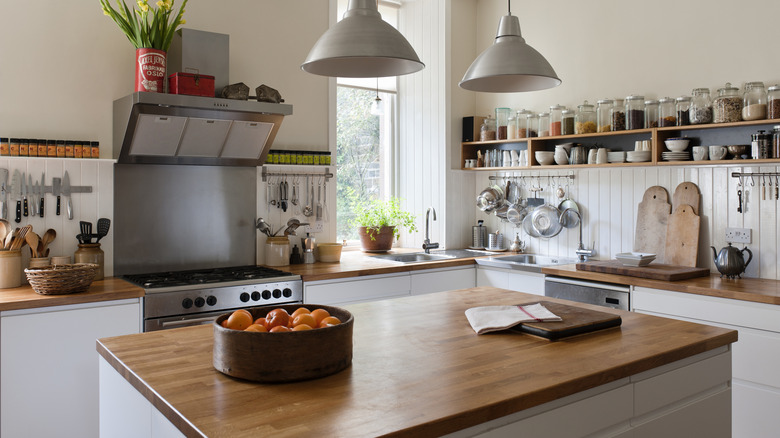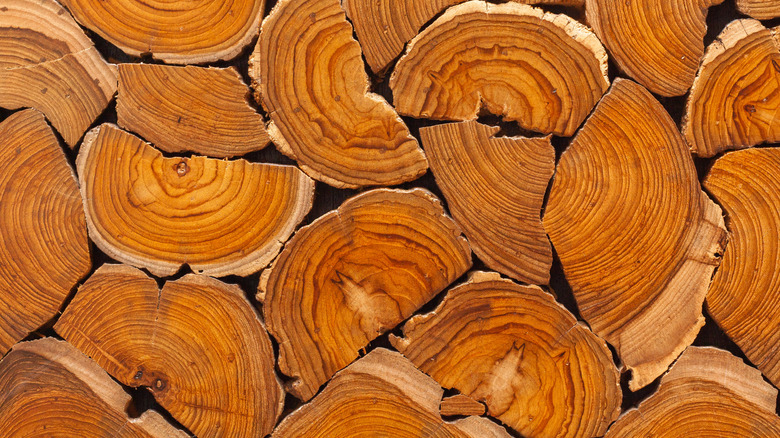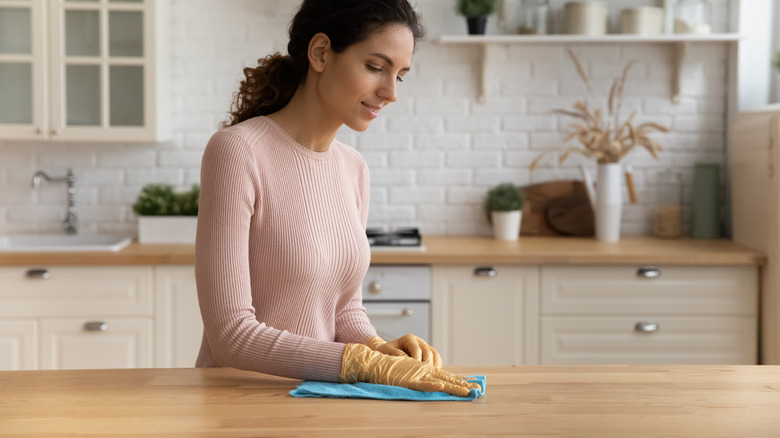The Exotic Wood You've Overlooked For Gorgeous Butcher Block Countertops
Are wooden countertops going out of style? Interior design experts and realtors alike tell us no! Butcher block countertops regularly appear in yearly lists of must-have kitchen interior options, heralded for their sustainability and easy maintenance. Butcher block countertops are made by gluing equally sized pieces of wood together in different configurations — edge, face, or end grain — to form a small or, in the case of a countertop, large board. The timber a block is made of matters for both aesthetics, price, and longevity, with maple, walnut, cherry, and even bamboo numbering among the most popular species. But there's one exotic and dramatic timber worth looking into before you rinse that kitchen renovation budget. So, what exactly is this top-rated wood countertop material for every type of kitchen? The tree in question is teak.
Teak trees (Tectona grandis) are deciduous hardwood trees native to tropical South and Southeast Asia, with the largest forest concentrations in Myanmar. In the past century or so, forestry companies started teak plantations in parts of Africa and, more recently, the Americas. Teak trees have been a treasured source of hardy, quality wood for centuries, possibly even millennia, for boat building due to the species' natural resistance to pests and moisture, even when freshly cut and untreated, golden brown color, and relatively straight grain. Sapwood, sourced from the outer layers of the trunk, is generally cheaper and lighter hued though a little less durable than heartwood. Today, teak is used as much for boat decks as it is for outdoor and indoor furniture and flooring. Why not put its advantages to good use in the kitchen, too?
A closer look at the benefits and downsides of teak butcher block countertops
Teak is tough wood, ranking almost at the top of the Janka Scale, an industry-standard measurement of timber hardness and durability. In layman's terms, this means teak can withstand lots of heavy skillet or cleaver drops before the surface sees even a shallow dent or ding. Few other timbers are so forgiving. Generally, wooden countertops are vulnerable to humidity and exposure to too much water too often can lead to rotting — around the sink, for example. Once again, teak proves the exception. It's exceptionally high in natural oils, making it spill resistant even when raw (though we don't recommend leaving planks so when using them in a countertop).
A 2008 study published in the Journal of Wood Chemistry and Technology found teak wood sawdust naturally inhibited the growth of various common wood-rotting fungus species. The compounds responsible for this attribute are tectoquinone and naphthoquinone and organic solvents deoxylapachol, isolapachol, and dehydrotectol. Teak also happens to be the lowest maintenance hardwood; it's great for busy households with boisterous, accidental-damage-causing children or pets.
Of course, few things in the world of home design are downside free. And butcher block countertops crafted from teak are no exception. The timber boasts a high silica content — well over 1 percent in many cases. It's what makes the wood so durable, but can also lead to blunt knives or dull kitchen equipment. Likewise, the oil that makes it so naturally water resistant can reduce the effectiveness of water-based glues. Teak is a relatively expensive timber, ranging somewhere from $100 to $200 per square foot, depending on the supplier.
Consider sustainability concerns when buying teak kitchen fixtures
The sustainability of teak is a concern. Wild stands are threatened by deforestation in Indonesia and Myanmar; the tree was listed in the IUCN Red List of Threatened Species as Endangered in 2021. The U.S. currently has a ban on teak imported from Myanmar due to the country's ongoing political situation, and there's some evidence that exposure to teak dust harms factory workers' health. To overcome these issues, look for products made from teak timber harvested from forests in Indonesia or the Americas with FSC (Forest Stewardship Council) certification. Alternatively, for those with carpentry skills, look for reclaimed teak planks and build the countertop yourself.
For example, the 99 Cent Floor Store sells a 60 x 30 x 1.5 inch teak oil rubbed workbench butcher block crafted in Indonesian from plantation teak for well under $200. Butcher block countertops by sustainable teak brand Sparrow Peak sell exclusively at Lowes, like this FSC certified 4 foot x 25 inch (1.5 inch thick) live edge option for about $400. If you prefer reclaimed teak, try Habitat For Humanity. Its Roaring Fork Valley store has a number of WoodArt PolyX oiled teak island butcher block countertops (72 x 36 x 1.2 inches) for a little over $300. Once your new countertop is in your kitchen, its care is relatively easy. To clean your solid wood worktops, use a soft brush and a dab of dish detergent, bleach, or distilled vinegar to remove stains, mold, or embedded dirt when you first notice them. Leaving it to sit will exacerbate the problem. Re-oil regularly.


